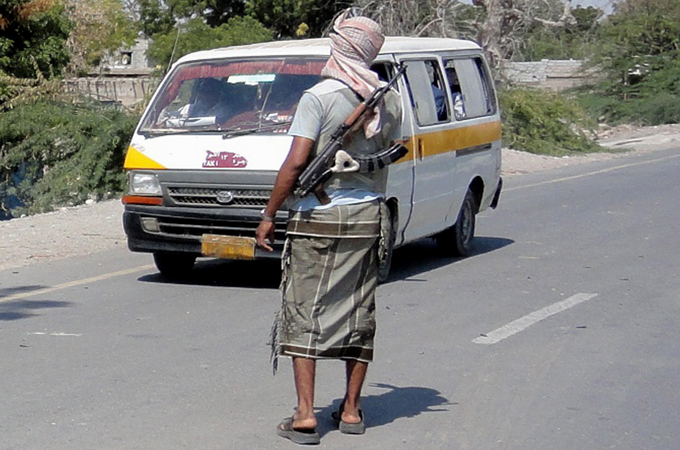Yemen fighters ‘to withdraw’ if inmates freed
Suspected al-Qaeda-linked group that took over Radda promises to withdraw from town if colleagues released from prison.

 |
| The group captured Radda earlier this week, taking advantage of the political turmoil which has gripped Yemen [EPA] |
Yemeni fighters who seized a small town southeast of the capital Sanaa this week have said they will withdraw if several of their colleagues are released from jail.
Tribesmen negotiating with the group on behalf of the government said the fighters, who took over Radda, about 170km southeast of Sanaa, agreed to leave if their leader’s brother and several others were freed.
Tareq al-Dahab, the fighters’ chief, is related to Anwar al-Awlaki, a US citizen whom Washington accused of a leadership role in the Yemeni branch of al-Qaeda, and who was assassinated in a drone strike last year.
Radda’s capture underscored US fears that political upheaval in Yemen over the fate of President Ali Abdullah Saleh will give al-Qaeda a foothold near shipping routes through the Red Sea and may spread to the world’s leading oil exporter Saudi Arabia.
Saleh formally handed over power to his deputy late last year, in line with a Gulf-brokered plan to end months of mass protests and bursts of open combat between his forces and those of a rebel general and tribal armed groups.
Under the deal, Saleh’s General People’s Congress and opposition parties divided up cabinet posts between them, forming a unity government to steer the country towards presidential elections in February.
Threats to handover
Saleh’s opponents accuse him of ceding territory to al-Qaeda related groups to bolster his assertion that his rule alone keeps al-Qaeda from growing stronger in Yemen, and ultimately aiming to retain power by sabotaging the transition deal.
Yehia al-Arasi, a spokesman for Abd-Rabbu Mansour Hadi, Yemen’s acting leader and vice president, dismissed comments by Abu Bakr al-Qirbi, the foreign minister, who suggested a day earlier that elections may be delayed due to deteriorating security.
“There is no scope for delaying the … election because it will be conducted under the supervision of the international community,” Arasi said.
Qirbi later backtracked on his statement.
Washington, which long backed Saleh as key to its “counterterrorism” policy, endorses the transition plan.
US Secretary of State Hillary Clinton said on Tuesday that Saleh was failing to meet his pledges under the deal and that Washington was “focused on the threat posed by al Qaeda in Yemen”.
Yemen’s parliament has yet to vote on a law – denounced by protesters demanding Saleh’s ousting – that would give him and his associates immunity from prosecution over the killing of protesters. The measure has the cabinet’s backing.
“The legitimacy of the parliament depends on the Gulf initiative and its operational mechanism. It must pass the law because it is written into the Gulf initiative,” Arasi said.